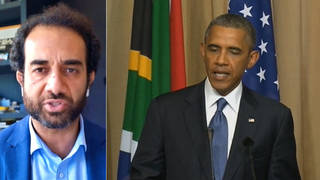
Topics
Guests
- Nawal El SaadawiEgyptian feminist and human rights activist. She was a political prisoner and exiled from Egypt for years.
Renowned feminist and human rights activist Nawal El Saadawi was a political prisoner and exiled from Egypt for years. Now she has returned to Cairo and is participating in the protests in Tahrir Square.
She spoke to Democracy Now! about the feeling of community that emerged in Tahrir Square, particularly after the violence last Wednesday night.
NAWAL EL SAADAWI: The men on horses were shooting everywhere and throwing — I don’t know — fireballs. I don’t know. I was seeing fireballs in the sky. I don’t know what was happening, because the men carried me away. They just carried me away from the scene. They told me, “You are 80. You cannot stay here.” So they carried me away from that. It was amazing. They were like my sons and daughter, you know, because they were surrounding me.
Blood was in the square. But the doctors and the group, the committee, the health committee, the doctors’ committee, took them, because there is now a hospital next to the Midan, where all doctors volunteered. And people, suddenly, in few minutes, people brought cotton and bandage and medicine. In few minutes, can you imagine? So we became like a city, square now, Midan Square, like a city, with its hospitals and with its police and everything.
I am very confident that we are winning. And now I feel the power of the people. I know the power of the people, but I never, never felt the power of the people like those days and especially tonight. The whole Midan is surrounded by the tanks, by the military tanks, and also by the group that — it’s like our police, you know? Police of the people, police of the demonstrations, who are not allowing anybody to enter until they see their card, etc., so that nobody of the gangs enter. It’s like a feast, like a festival. People are dancing, saying poetry. They are singing. Poets are writing poetry and reciting. So it became a cultural event, a culture event. It is amazing what’s happening tonight. What happened tonight was amazing.
I am a doctor. I am a psychiatrist. And I am a writer, and I observe myself. I don’t feel tired. Before that, if this happened, in a normal situation, I would be exhausted. But I’m so happy. People are coming to my home, so the walls of our apartment broke down. People visit each other at night. People sleep in tents in the square and mix together. Through the whole of people, there are no families now. We don’t have families and special homes and special apartments; we became one in the street. And even those who come to their home, they come temporarily, to have a shower. I came to have a shower and then go, you know? And then go back. So the plan is, we will never move. And we are increasing, increasing, increasing, until Mubarak say, “I’m leaving. I’m leaving.” And then we put him on trial, because now the slogan, it’s not enough for him to leave; he should be on trial for the crimes, for the killing of hundreds of innocent Egyptians who are 20 years of age.











Media Options